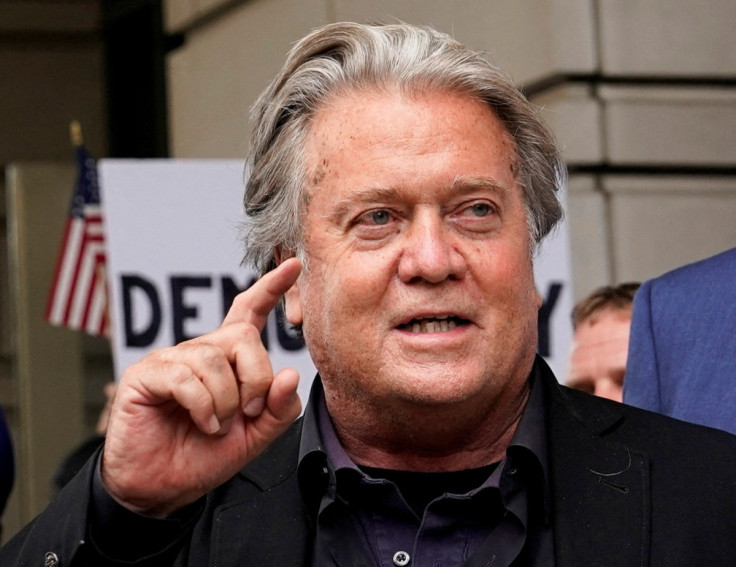Trump Ex-adviser Bannon Seeks Dismissal Of Contempt Of Congress Charges

A lawyer for Steve Bannon, a prominent former presidential adviser to Donald Trump, asked the judge in his criminal trial on Thursday to dismiss charges of contempt of Congress for defying a subpoena by the committee investigating last year's attack on the U.S. Capitol.
Evan Corcoran, one of Bannon's defense attorneys, made the motion to U.S. District Judge Carl Nichols a day after the prosecution rested its case, having called only two witnesses.
Bannon, 68, has pleaded not guilty to two misdemeanor counts after rebuffing the House of Representative select committee's subpoena requesting testimony and documents as part of its inquiry into the Jan. 6, 2021, rampage by Trump supporters trying to overturn his 2020 election defeat.
"We would ask the court to grant our motion for judgment of acquittal. The government has rested its case and they have not presented evidence upon which a reasonable person can find beyond a reasonable doubt that Mr. Bannon is guilty of the charges of contempt of Congress," Corcoran told the judge.
Bannon's primary defense is that he believed the subpoena's deadline dates were flexible and subject to negotiation between his attorney and the committee. Kristin Amerling, a senior committee staff member, testified on Wednesday that the deadlines were not flexible and that a lawyer for Bannon had never sought any extensions.
Corcoran on Thursday told the judge that even though Amerling testified the subpoena dates were inflexible, she was unable to articulate why those dates were selected or who picked them.
"No reasonable juror could find that Mr. Bannon refused to comply with dates that we now understand were open - were in flux," Corcoran told the judge.
The prosecution asked the judge to reject the defense motion.
"The government has presented sufficient evidence," prosecutor Amanda Vaughn said. "The reasons for the dates are irrelevant. The dates are on the subpoena. The committee made clear in its letters to the defendant that those were the dates and they had violated them."
If the judge rules against the defense motion, Bannon's lawyers would then have a chance to present their case to the jury. A possible defense witness could be Robert Costello, Bannon's attorney who served as the key point of contact with the committee after its September 2021 subpoena.
The prosecution's two witnesses testified on Tuesday and Wednesday. Amerling testified that Bannon disregarded the subpoena's two deadlines, sought no extensions and offered an invalid rationale for his defiance - a claim by Trump involving a legal doctrine called executive privilege that can keep certain presidential communications confidential.
The other prosecution witness was FBI special agent Stephen Hart, who investigated the circumstances of Bannon's defiance of the subpoena.
On Wednesday, the judge let the defense inform jurors that Trump this month gave the green light for Bannon to testify before the committee after previously asking him not to cooperate. The judge also allowed him to introduce other recent correspondence between Bannon and the committee related to Bannon's abrupt offer to testify.
Nichols told jurors they cannot consider Bannon's belief about executive privilege as an excuse or consider future offers of compliance as a defense against prior non-compliance.
Trump's supporters stormed the Capitol and attacked police in a failed effort to block formal congressional certification of his 2020 election loss to Democrat Joe Biden, which Trump falsely claims was the result of widespread voting fraud. Bannon was a key adviser to Trump's 2016 presidential campaign, then served in 2017 as his chief White House strategist.
Copyright Thomson Reuters. All rights reserved.





















